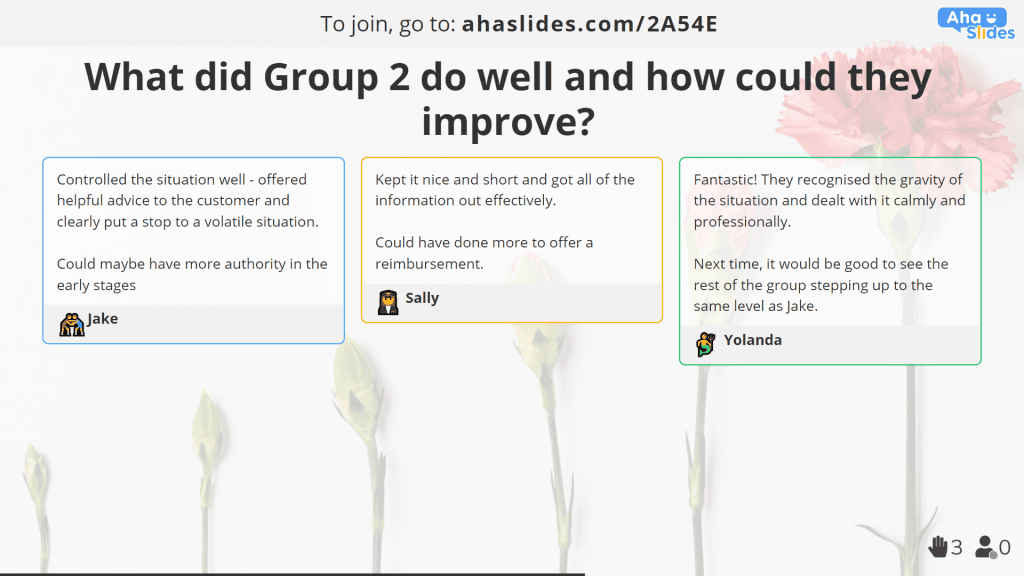メンタル インテリジェンス vs リーダーシップにおける心の知能指数優れたリーダーにとって、どちらがより重要ですか?2024年のAhaSlidesベストガイドをご覧ください
感情的知性が高いリーダーは、精神的知性が高いリーダーよりもリーダーシップと管理に優れているかどうかについて、物議を醸す議論がありました。
世界中の偉大なリーダーの多くは高いIQを有していますが、IQがあってもEQがなくてもリーダーシップの成功は保証されません。リーダーシップにおける感情的知性の本質を理解することは、経営陣が適切な選択と意思決定を行うのに役立ちます。
この記事では、心の知能指数の概念を説明することに焦点を当てるだけでなく、リーダーシップにおける心の知能指数の役割と、このスキルを実践する方法についてさらに深い洞察を学びます。
概要
| 「感情的知性」を発明したのは誰ですか? | 博士ダニエルゴールマン |
| 「感情知能」はいつ発明されたのでしょうか? | 1995 |
| 「感情的知性」という用語を最初に使用したのは誰ですか? | UNHのジョン・D・メイヤーとエール大学のピーター・サロヴィー |
目次
- 心の知能指数とは?
- あなたが得意な感情的知性スキルはどれですか?
- リーダーシップにおける感情的知性がなぜそれほど重要なのでしょうか?
- リーダーシップで感情的知性を実践するには?
- 主要なポイント(要点)
- よくあるご質問

AhaSlidesのその他のヒント

チームを引き付けるためのツールをお探しですか?
AhaSlidesの楽しいクイズでチームメンバーを集めましょう。AhaSlidesテンプレートライブラリから無料のクイズにサインアップしてご参加ください!
🚀無料クイズをつかむ☁️
心の知能指数とは?
心の知能指数の概念は、一般的に使用されるようになりました ダニエル·ゴールマン 1990 年代に登場しましたが、1964 年の Michael Beldoch による論文で最初に登場しました。この論文は、誰かが自分自身と他の人の感情を知覚および監視し、それらを使用して他の人の思考と行動を導く能力を持っていることを示しています。
感情的に知的なリーダーの例
- 開放性、敬意、好奇心を表現し、他の人の話や感情に積極的に耳を傾け、気分を害することを恐れない
- 集合的な目的意識と、それらを達成するための戦略的計画の開発
- 自分の行動や過ちに責任を持つ
- 熱意、確実性、楽観主義を生み出し、奨励するだけでなく、信頼とコラボレーションを構築する
- 組織の変化と革新を促進する複数の視点を提供する
- 一貫性のある組織文化の構築
- 自分の感情、特に怒りや失望をコントロールする方法を知る
あなたはどの心の知能指数のスキルが得意ですか?
「リーダーとは何か」という記事を紹介する際に、 ダニエル·ゴールマン 次のように明確に説明されている 5 つの要素を使用して、リーダーシップにおける感情的知性を定義します。
#1。 自己認識
自分の感情とその理由を自覚することは、他者の感情を理解するための第一歩です。また、自分の長所と短所を理解する能力も重要です。リーダーシップの立場にあるなら、自分の感情のうち、どの感情が部下にプラスの影響を与えるか、あるいはマイナスの影響を与えるかを自覚しておくべきです。
#2。 自己制御
自己制御とは、変化する状況に合わせて感情をコントロールし、適応させることです。落胆や不満から立ち直り、自分の価値観に合った行動をとる能力も自己制御に含まれます。リーダーは怒りや激怒を適切にコントロールできず、チームの効果を保証することができません。リーダーは正しいことを行う意欲よりも、間違ったことをしてしまうことへの恐怖の方が大きいのです。これは全く異なる話です。
#3。 共感
リーダーの多くは、他者の立場に立って考えることができます。特に意思決定においては、タスクの達成と組織の目標を最優先に考えなければならないため、他者の立場に立って考えることができる人は多くありません。感情知能の高いリーダーは、チームメンバーが取り残されたり、不公平な問題が発生したりしないよう、あらゆる行動や意思決定において思慮深く配慮します。
#4。 動機
ジョン・ハンコックは、「ビジネスにおける最大の能力は、他者とうまく付き合い、彼らの行動に影響を与えることだ」と言いました。しかし、どうすれば他者とうまく付き合い、影響を与えることができるのでしょうか?モチベーションは、リーダーシップにおける感情的知性の核心です。モチベーションとは、漠然としながらも現実的な目標を達成したいという強い願望であり、自分自身だけでなく、部下にもその目標に加わるよう促すことです。リーダーは、何が従業員のモチベーションを高めるのかを理解する必要があります。
#5。 社会的スキル
ソーシャルスキルとは、他者との接し方、つまり人間関係の管理です。デール・カーネギーが「人と接する際には、相手が論理の生き物ではなく、感情の生き物であることを忘れてはならない」と言ったことは、まさにその通りです。ソーシャルスキルは優れたコミュニケーション能力と深く結びついています。そして、彼らは常にチームメンバーが見習うべき行動と規律の最良の模範となるのです。

リーダーシップにおける感情的知性が非常に重要なのはなぜですか?
リーダーシップにおける心の知能指数の役割は否定できません。 リーダーとマネージャーが、リーダーシップの有効性のために感情的知性を活用するのに適切な時期に思えます。 特にビジネスのリーダーシップ、教育訓練、サービス産業などにおいて、罰と権限を使用して他の人にあなたのルールに従うよう強制する時代はもはやありません.
歴史上、何百万人もの人々に強い影響を与え、マーティン・ルーサー・キング・ジュニアのようにより良い世界を目指して努力してきた、感情的に知的なリーダーシップの理想的なモデルは数多くあります。
彼は、正義と平等のために立ち上がることで人々を鼓舞し、自らの道へと導く、高いレベルの感情的知性を発揮したことで知られています。リーダーシップにおける感情的知性の最も典型的な例の一つとして、マーティン・ルーサー・キングは、自身の最も純粋な感情と思いやりをもって、同じ価値観と未来へのビジョンを共有することで、聴衆と心を通わせました。
リーダーシップにおける感情知能のダークサイドとは、アダム・グラントの著書でも言及されているように、人の思考を操作したり、ネガティブな感情を誘発して有害な目的を達成するためのテクニックとして利用することです。適切に活用しなければ、諸刃の剣となるでしょう。
リーダーシップにおける感情知能の活用に関する最も象徴的な悪例の一つは、アドルフ・ヒトラーです。彼は感情知能の力にすぐに気づき、戦略的に感情を表現することで人々を説得し、個人崇拝へと導きました。その結果、彼の支持者たちは「批判的に考えることをやめ、ただ感情を表現する」ようになったのです。
リーダーシップで感情的知性を実践する方法?
『プライマル・リーダーシップ:優れたパフォーマンスを生み出す隠れた原動力』の中で、著者は感情的リーダーシップのスタイルを2001つのカテゴリーに分類しました。権威型、コーチング型、親和型、民主型、ペースセッティング型、そして強制型です(ダニエル・ゴールマン、リチャード・ボヤツィス、アニー・マッキー、XNUMX年)。感情的リーダーシップのスタイルを選択する際には、それぞれのスタイルが部下の感情や直感にどれほど影響を与えるかが分からないため、慎重に行う必要があります。
リーダーシップで感情的知性を実践する5つの方法を次に示します。
#1。 マインドフルネスを実践する
あなたが言うこととあなたの言葉の使い方に注意してください。 最も注意深く思慮深い方法で思考を練習することは、自分の感情を管理し、それに対応するのに役立ちます。 また、ネガティブな感情を軽減するのにも役立ち、燃え尽き症候群や圧倒される可能性が低くなります. 日記を書いたり、一日の終わりに自分の活動を振り返ったりするのに時間を費やすことができます。
#2。 フィードバックを受け入れて学ぶ
従業員と心を通わせるには、サプライズでコーヒーや軽食を用意して、従業員とじっくり話をする時間を設けるのも良いでしょう。従業員が本当に必要としているもの、そして彼らのモチベーションを高めるものは何なのかを知るために、アンケート調査を行うのも良いでしょう。このような深い対話とアンケートからは、多くの貴重な情報が得られます。高い感情知能を持つ著名なリーダーの例からもわかるように、チームからフィードバックを得るには、誠実で質の高い対話が最良の方法です。フィードバックの内容は肯定的なものでも否定的なものでも受け入れ、不満や興奮を抑える練習をしましょう。フィードバックに左右されないように、自分の判断を左右される前に、冷静に考えましょう。

#3。 ボディーランゲージについて学ぶ
ボディランゲージの世界への深い洞察を学ぶために時間と労力を費やすことは、決して無駄にはなりません。相手のボディランゲージを見ること以上に、相手の気分を理解する良い方法はありません。特定の仕草、声のトーン、視線のコントロールなどから、相手の本当の考えや感情が明らかになることがあります。相手の行動の細部を決して見逃さないことで、相手の本当の感情をより正確に推測し、迅速かつ適切に対応できるようになります。
#4。 特典と罰について学ぶ
どのような特典や罰が従業員のやる気を引き出すのに効果的かを考えている場合は、酢よりもハチミツの方が多くのハエを捕まえることを覚えておいてください. 多くの従業員が、素晴らしい仕事をしたときや成果を上げたときに上司から称賛されるのを好むのは、どういうわけか真実です。
仕事の成功の約 58% は心の知能指数に基づいていると言われています。 場合によっては、特に平等と信頼を維持し、対立を防ぎたい場合は、罰が必要です。
#5。 オンライン コースまたはトレーニングを受講する
遭遇しないと解決方法がわかりません。 心の知能指数の向上に関するトレーニングやコースに参加する必要があります。 従業員と関わり、柔軟なシナリオを実践する機会を与えるトレーニングを検討できます。 また、トレーニング セッション中に競合を解決するさまざまな方法を学ぶこともできます。
さらに、共感を養い、他者への理解を促進するために、さまざまなチームビルディング活動を使用して、従業員向けの包括的な心の知能指数トレーニングを設計できます。 そうすることで、ゲーム中の彼らの行動、態度、行動を観察する機会を持つことができます。
主要なポイント(要点)
では、どんなリーダーになりたいですか? 基本的に、感情的知性をリーダーシップに使用することに完全な正解や不正解はありません。 短期的な目標と長期的な目標の両方を追求する場合、リーダーは心の知能指数のスキルを身に付けることを検討する必要があります。
どのようなリーダーシップ スタイルを実践することを選択しても、 あはスライド チームの有効性と結束を高めるために、従業員のトレーニングと関与においてリーダーを支援するための最適な教育およびトレーニングツールを適切に提供します。 試す あはスライド チームのパフォーマンスを向上させるために、すぐに活用しましょう。
よくあるご質問
心の知能指数とは?
心の知能(EI)とは、自身の感情を認識、理解、管理する能力、そして他者の感情を効果的に捉え、対応する能力を指します。感情の認識、共感、自己制御、そして社会的な交流に関わる一連のスキルが含まれます。したがって、リーダーシップの立場において非常に重要なスキルです。
心の知能指数は何種類ありますか?
内的動機づけ、自己調整、自己認識、共感、社会的認識の XNUMX つの異なるカテゴリがあります。
心の知能指数の 3 つのレベルとは何ですか?
XNUMX つのレベルには、依存型、自律型、および協調型が含まれます。








